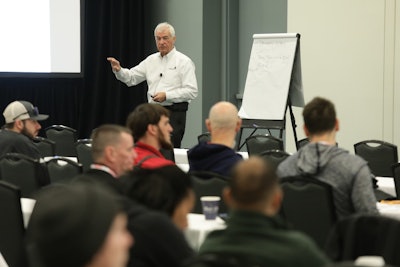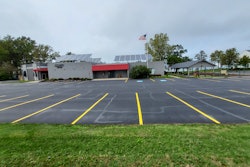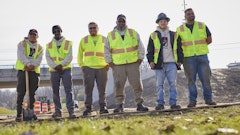
Attention to detail is the name of the game in the asphalt industry, a lesson occasionally overlooked by many contractors. Luckily for industry veteran Wayne Jones, every experience in his career has taught him that the little things can actually turn out to be the big keys to success.
“Attention to detail will make or break any project,” Jones says. “When you're out there in the heat of battle on the jobsite, it's easy to forget and maybe cut a few corners. But that attention to detail is what quality is all about. And everybody on the crew should be empowered as a quality control manager to make sure you’re going to get the best results possible.”
Jones has used this quality-focused mindset since his first days in the industry. Experiences that may not have happened if it weren’t for a few fortunate “accidents.”
Experience Leads to Knowledge
Jones started out at Junior College considering a major in business, but was told to maybe rethink that option.
“They looked at my English and grammar grades, and then my math and science, and told me I should probably consider pre-engineering instead,” Jones laughs. “When I transferred to the University of Illinois, they wanted to know what kind of engineering. I told them I wasn't sure, but I liked building thing.”
Jones was put in the School of Civil Engineering once he told them his new father-in-law was a township road superintendent. Jones obtained a Master’s Degree in Transportation Planning in just five years and his goal was to work for the Illinois Department of Transportation after graduation. A hiring freeze in the state however, altered those plans.
“I was working part time for a paving contractor, University Asphalt, while earning my degree and they asked me to stay on after graduation,” Jones says. “So, I ended up staying due to the hiring freeze and kind of accidentally got into the asphalt construction industry.”
Jones started out as an estimator for University Asphalt which then led to chief estimator, then purchasing agent. After a paving division lost their manager, Jones was asked to take over.
“Roger Yarborough was the owner of the company and was very quality-minded,” Jones says. “He was active in the Illinois Asphalt Pavement Association eventually serving as their president. Later he also served in all the offices of the National Asphalt Pavement Association (NAPA), and eventually as their president. “Roger always believed in giving back the industry. So much so, that he served on the steering committee that created the National Center for Asphalt Technology (NCAT) at Auburn University. Needless to say, his focus on the details to achieve success and spirit of giving back to the industry rubbed off on me.”
Jones went on to explain how he learned the importance of attending national conferences and trade shows such as NPE early on in his career. Soon after attending a national conference where he learned about “bolt-on” screed extensions, his division was the successful bidder on a regional airport paving project. By extending the screed to 25 feet, Jones’ crew was able to pave the 150 wide runway in only 6 passes rather than the 12 passes normally required. After the project was complete, Jones submitted the project for consideration for a NAPA Quality Paving Award. When the judges visited the project to give it a quality score the longitudinal joints that he eliminated were given a perfect score of 100%. When the winners were announced at the end of the year, Jones got to attend the NAPA annual meeting in Honolulu to pick up the 1985 Best Quality Airport Paving Award, because he attended a national paving conference.
“All these “sort of accidents” really ended up helping my career in the long run,” Jones says.
After his time at University Asphalt, Jones began working for APAC, in charge of their Lexington, KY operations. He soon was promoted and took over as division president for MacAsphalt, an APAC division in central Florida, with four branch offices. His crews paved sections of I-75 on the westside, I-4 across the middle, and I-95 on the eastside of the state.
While it was privately held, MacAsphalt had been the only company to ever pave the Daytona International Speedway. So, when Darlington Speedway needed resurfacing, NASCAR flipped thru their Rolodex and called MacAsphalt’s main office. Jones took the call and took up the challenge. Over the summer he put a crew on the road that ended up paving Darlington, Rockingham, Charlotte, and part of the Atlanta Motor Speedways. “The next summer that same crew paved the newly constructed 1.25 mile tri-oval Indy Race League track at the Magic Kingdom,” Jones says.
Speedway paving really confirmed the need for paying attention to the details. Most NASCAR tracks have high-banked turns ranging from 24-33 degrees of superelevation, which truly make them the “high-wire” balancing act of asphalt paving. Visualize standing in the infield looking up at one of the turns, 40 feet straight out the laydown equipment is over 20 feet above you. “That’s when it hits you; there is absolutely no room for error when trying to safely keep men, material and equipment on a slope that is almost impossible just to stand up on, much less, place and compact hotmix asphalt on.”
Knowledge Leads to Teaching
After 27 years managing projects from driveways to interstates, Jones decided to take his skills to the classroom.
“Call it a midlife crisis if you will, but I saw the Asphalt Institute (AI) had an opening and I applied,” Jones says. While at the U of I, one of my materials courses was actually an asphalt mix design class and we used the AI’s Mix Design Manual, so AI has been on my radar from the beginning of my career!”
“When you’re out on the jobsite, sometimes you see a lot of bad paving. I just wanted to share my knowledge, help the young people, and stay on the cutting edge. Now I get paid to travel and teach engineers and contractors how to build better asphalt pavements.”
The Asphalt Institute focuses on their deep history of research that began in 1919 when the association was formed to help agencies and contractors put their findings into practice to lay down the longest lasting asphalt pavements possible. Jones was hired to relay that information to contractors in a way that made sense to them.
“We take that cutting-edge research, and we go out and teach the state DOTs and contractors the latest techniques and technologies in terms of testing, pavement design and construction,” Jones says. “We also write and update our series of technical manuals that we keep updated and available for the industry to stay up to date on the latest changes in specs and design requirements.”
Jones is also able to get out on-sites to teach contractors best practices and always keeps that attention to detail on top of their minds.
“That's really the secret to quality, the attention to detail,” Jones says. “On the jobsite, you can tell pretty quickly the contractors who are quality-focused, they are looking at the details. For example, when the material comes out of the truck, it's a lot cheaper to reject bad mix while it's still on the truck, then after it's put down on the pavement and rolled into place. Next, they are watching the flow of material through the paver. They are rolling right behind the paver. Paying attention to the little things.”
“It’s imperative that everybody on a crew is quality-minded,” Jones continues. “They have to come together as a team, share the load and make sure everybody is doing their part to make sure that they're putting out a quality product at the end of the day.”
And education is key to this.
“Like I said, in the heat of the battle, you can forget about the quality, but you can’t,” Jones says. “When you get a new person on the crew and they are assigned to learn from an experienced crew member, that person will teach not only his good practices, but also their bad habits they’ve developed over the years. This is where ongoing training becomes critical. Whether you're a young person in my class or a seasoned veteran, it's always good to learn, or relearn, the quality processes that you need to be thinking about while the construction is going on. That’s only going to lead to success.”
Jones has traveled the world over the past 21 years for AI. In 2007 he participated in the Federal Highway Administration’s European Warm-mix Asphalt Scan tour to learn about this new technology. His next trip overseas was in 2010 to Doha, Qatar to help that country begin to improve their highway infrastructure as they prepared to host this year’s 2022 World Cup!
All this travel has convinced him that wherever you go in the world this industry has so much to offer an individual based on everyone’s willingness to share their experiences in a spirit of camaraderie. For the past 16 years, Jones has partnered with the National Pavement Expo (NPE) and thoroughly enjoys working with the next generation of the asphalt industry.
“It's really fun and rewarding to teach the young people,” Jones says. “You stand up there and you see all the enthusiasm these young people bring to the table and they’re all optimistic. It's always a warm and fuzzy feeling when you realize that the future of the industry is right there in front of you and it’s your job to help teach them how to do their job in the best possible way.”



![Lee Boy Facility 2025 17 Use[16]](https://img.forconstructionpros.com/mindful/acbm/workspaces/default/uploads/2025/09/leeboy-facility-2025-17-use16.AbONDzEzbV.jpg?auto=format%2Ccompress&fit=crop&h=100&q=70&w=100)








![Lee Boy Facility 2025 17 Use[16]](https://img.forconstructionpros.com/mindful/acbm/workspaces/default/uploads/2025/09/leeboy-facility-2025-17-use16.AbONDzEzbV.jpg?ar=16%3A9&auto=format%2Ccompress&fit=crop&h=135&q=70&w=240)








